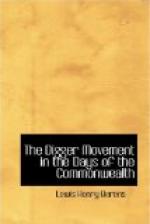[55:1] The full truth of these words comes home to us when we bear in mind that the law (De Comburendo Heretico) sanctioning the burning of heretics was only repealed in the reign of Charles the Second (in 1677), the Bishops of the day opposing its repeal almost to a man.
[56:1] King’s Pamphlets. British Museum, Press Mark, E. 2137.
[58:1] “The early Friends were men of prayer, and diligent searchers of the Holy Scriptures. Unable to find true rest in the various opinions and systems which in that day divided the Christian world, they believed that they found the Truth in a more full reception of Christ, not only as the living and ever-present Head of the Church in its aggregate capacity, but also as the life and light, the spiritual ruler, teacher and friend of every individual member.”—Book of Discipline of the Society of Friends. Quoted by J. S. Rowntree, Society of Friends: its Faith and Practice, p. 24. See also Barclay’s Apology for the true Christian Divinity, p. 1: Second Proposition.
[60:1] “It is the inward master (saith Augustine) that teacheth, it is Christ that teacheth, it is inspiration that teacheth: where this inspiration and unction is wanting, it is vain that words from without are beaten in.” And thereafter: “For he that created us, and redeemed us, and called us by faith, and dwelleth in us by his Spirit, unless he speaketh unto you inwardly, it is needless for us to cry out.”—From Barclay’s Apology, p. 13.
[61:1] “If instead of assuming the being of an awful deity, which men, though they cannot and dare not deny, are always unwilling, sometimes unable, to conceive, we were to show them a near, visible, inevitable, but all-beneficent deity, whose presence makes the earth itself a heaven, I think there would be fewer deaf children sitting in the market-place.”—John Ruskin, Modern Painters.
[62:1] British Museum, Press Mark, 4372, a.a. 17. Below the title appears the following words: “Professors of all forms, behold the Bridegroom is coming, your profession will be tried to purpose, your hypocricy shall be hid no longer. You shall feed no longer upon the Oil that was in other men’s Lamps (the Scriptures), for now it is required that everyone have Oil in his own Lamp, even the pure testimony of truth within himself. For he that wants this, though he have the report of it in his book, he shall not enter with the Bridegroom into the chamber of peace.”
[63:1] “The incomprehensible Spirit Reason!” It is interesting to note here that the “Tau” of the great Chinese philosopher, Lau-tsze,—the word he uses to denote the Absolute, which, consequently, he wisely leaves vague and undefined, and which apparently has no English word exactly equivalent to it,—suggests to his translator three English words—“the Way, Reason, and the Word.” The latter’s one objection to the word Reason as an equivalent is that to him it “seems to be more like a quality or attribute of some conscious being than Tau is.” See The Speculations of the old Philosopher Lau-tsze, by John Chalmers, M.A. Introduction.




